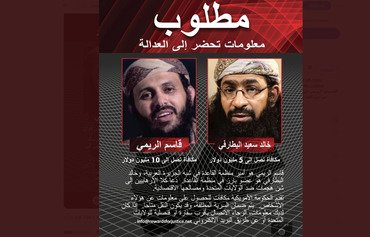A recently announced reward for information that would disrupt Hizbullah's financial system is likely to yield results beyond the immediate goal of apprehending targeted individuals, experts told Al-Mashareq.
The US State Department on April 22nd announced a $10 million reward for information that would disrupt the finances of Hizbullah.
This would include information on the financial institutions and mechanisms the party uses to facilitate the movement of its funds, and the identification of its major donors and the businesses it controls.
The financial crisis that is buffeting Hizbullah as a result of the financial siege imposed on it will have an impact in ensuring the success of the financial reward programme, experts in the region said.
![Hizbullah fighters attend a party celebration in the southern suburbs of Beirut. [Photo circulated on social media]](/cnmi_am/images/2019/05/03/17872-Hizbullah-beirut-suburbs-600_384.jpg)
Hizbullah fighters attend a party celebration in the southern suburbs of Beirut. [Photo circulated on social media]
"By observing reactions to the announcement of rewards for information on terrorists, especially Hizbullah elements and officials, it can be said these will undoubtedly yield the desired result," said Al-Sharq Centre for Regional and Strategic Studies researcher Fathi al-Sayed, an Iranian affairs specialist.
This is because these rewards offer a strong financial incentive for many within the party's inner circles, and may lead to the downfall of others who have financial dealings with the party, he told Al-Mashareq.
Disrupting Hizbullah's funding
The rewards for information programme also serves as a "deterrent to many people working with the party, compelling them to stop, and to those whom the party is trying to lure into working within its network", al-Sayed said.
This helps to achieve the objective of reducing the amount of cash that reaches the party that enables it to operate and pay salaries to implement the projects of Iran's Islamic Revolutionary Guard Corps (IRGC) around the world, he said.
The US reward "presents a golden opportunity for many who co-operate financially with Hizbullah", said Salah Mansour, who is related to a senior Hizbullah official and asked to use a pseudonym out of concern for his safety.
These people "work with the party on the basis of profit and loss, not the basis of principle or policy", according to Mansour, who had been close to the party’s leadership in Lebanon's Bekaa Valley before splitting from the group.
Mansour told Al-Mashareq that Hizbullah has put in place a hierarchical network "to launder money and transfer it to the party's coffers" that seems very complex, but may in fact not be difficult to penetrate.
This is because some individuals engaged in laundering money for Hizbullah do so through a number of companies that serve as a front, he said, meaning the arrest of one person will undoubtedly disrupt the larger funding process.
Breaking collaborators' silence
Hizbullah's financial crisis will have a significant impact on the success of the rewards for information programme, said Mazen Zaki, who heads the new media department at Egypt's Ibn al-Waleed Studies and Field Research Centre.
"The decline in funding will drive many party members and civilian collaborators to break their silence," he told Al-Mashareq.
This is especially the case "as it is known that the US guarantees complete confidentiality for those who provide correct information and guarantees their safety and the safety of their families", he said.
Those who are directly connected to Hizbullah or are collaborating with it are currently experiencing financial crises as a result of the decline in the party’s liquidity, and so they may be easy to bring around, Zaki said.
Many of these connections and collaborators are not party members, he noted.
Zaki said the reward for information can be seen as "one of the weapons used in the media war declared on Hizbullah and all the IRGC's arms around the world".
As such, it is "a very effective tool", he said.

![Hizbullah member and financier Adham Tabaja was designated by the US State Department in June 2015 for providing support and services to the party. [Photo circulated on social media]](/cnmi_am/images/2019/05/03/17871-Adham-Tabaja-sanctions-600_384.jpg)






America which destroyed Iraq and opened the door to terrorism wide open, isn’t it a terrorist state? It has facilitated the matter for Iran to export its terrorism. Russia has turned the land of Syria and its people into a field to experiment with its weapons. It has slaughtered people and destroyed stones. Isn’t it a terrorist state? What has happened, and is happening, to Rohingya, isn’t it from a terrorist state? I wonder if there is no terrorism or terrorists in the world except for the terrorism of "Islamic State of Iraq and Syria" (ISIS). Whoever watches al-Arabiya TV or al-Arabiya al-Hadath and other media outlets that are seen as allied with Sunnis report on terrorism and the death industry, they would find that they focus on al-Qaeda and ISIS. ISIS up and ISIS down! Why the focus on ISIS? They have shown the world that the source of terrorism and extremism is Sunni Muslims. Is it because they are Sunnis? However, Sunnis and God’s religion have nothing to do with them. They’re heretics against God’s religion and were only there to maim God’s religion. They were made to live among the Sunnis only to slaughter Sunnis and destroy their cities and villages. This has actually happened. They were made by Iran, Magis, Zionists and Crusaders. Why don’t they look at other crimes and those who committed them? Others have committed way much more crimes than ISIS and in a more heinous and despicable way. What happened, and is happening in Iraq, Syria and Yemen at
Reply1 Comment(s)